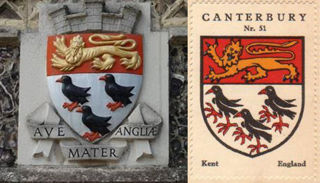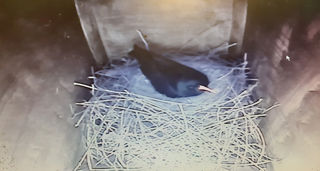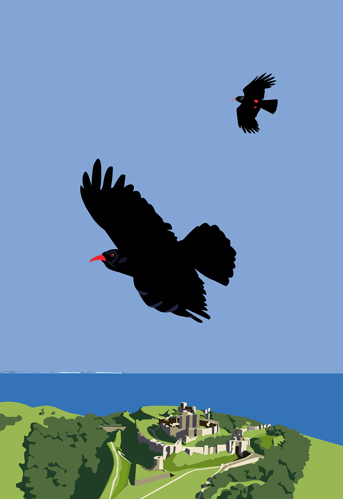The project
For over 200 years the Red-billed chough has been missing from Kent, but we have partnered with Kent Wildlife Trust to reintroduce this magnificent bird to the cliffs of Dover. We are also indebted to other stakeholders in this project including Paradise Park in Cornwall, the White Cliffs Countryside Partnership, English Heritage and Durrell Wildlife Conservation Trust at Jersey Zoo.
We could not have set this project up without the unwavering support of the public. Thanks to your generous donations and other funding, we are well on our way to seeing these acrobatic birds soaring above the cliffs of Kent again.
We are currently preparing for this year's breeding season where the chough at Wildwood and Paradise Park will rear chicks to be released later this year.

Despite once being a common sight on the coasts of Kent and across England, chough populations have plummeted to only 23 pairs today. Intensification of farming has reduced viable habitat and with it the specialist diet of insects these birds feed on. Historic persecution has also whittled down their numbers. We know chough were once abundant here from historical records and literature. They are depicted on the Canterbury coat of arms and in the story of Thomas Becket’s murder.
Strongholds of Chough remain in Ireland and Wales, but the limited dispersal ability of this species means they require assistance to re-establish populations, even where habitat is suitable.
Choughs are unlike other corvids and have quite specific habitat requirements. They like to nest on cliffs to remain safe from predators, and they also require insect-rich grassland to forage for food. Dover is well known for its cliffs, but what the cliffs are made of is also very important for chough. Chalk grassland is an incredibly rare habitat, with 50% of all global chalk grassland being located in England. It has one of Western Europe's most diverse plant communities and also exceptionally high insect biodiversity.
A successful chough restoration project was trialed on the island of Jersey between 2013-2018 which has restored the species back to Jersey. The project was a partnership between Jersey Zoo, the States of Jersey and The National Trust for Jersey. We are extremely grateful to our colleagues at Jersey Zoo for their generous advice and guidance. Many of the techniques developed on Jersey are being used to guide the Kent project.
The reintroduction of the chough will drive the restoration of this and other important habitats along our coastline which will benefit the recovery of other wildlife. Now, it is more important than ever to return missing species and the complex habitats on which they depend.

This exciting project would not have been possible without the breeding programme for the species which has been managed by Paradise Park in Cornwall for over 30 years. We work closely with Paradise Park who set up our breeding pairs of chough at Wildwood.
Conservation breeding requires particular techniques to ensure that these birds will be able to survive in the wild and will have the necessary social skills to mate and live alongside each other. Occasionally keepers assist in the rearing of chicks to ensure the maximum number of chicks survive.
The parent birds have also been specially selected to ensure genetic diversity is high and the risk of in-breeding is low.
The reintroduction of the Red-billed chough to Kent is the first step in a much broader vision to help restore the birds across Southern England and their coastal habitat.
Check out Kent Wildlife Trust’s page on the chough reintroduction here.
If you would like to get involved, please contact suzanne@wildwoodtrust.org to find out more.

Download our chough education pack which outlines some of the key topics of learning from the Chough Reintroduction Project for students in Key Stage One and Key Stage Two. Kent Wildlife Trust and Wildwood Trust offer workshops for all topics within this pack.
